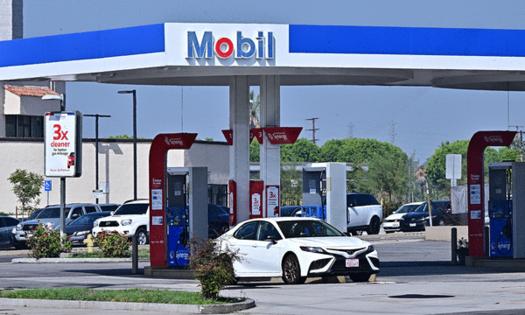After California Gov. Gavin Newsom gas bill passes, Republicans call to delay climate vote that may hike prices
Published in News & Features
SACRAMENTO, Calif. — Just a day after Governor Gavin Newsom passed a law intended to curb price spikes, Republicans have called on the state’s air regulator to postpone an upcoming vote that analysts warn could drive prices higher at the pump.
More than two dozen state Republican lawmakers blasted the Air Resources Board in a letter Tuesday for neglecting to say how changes to the Low Carbon Fuel Standard (LCFS), the state’s transportation emissions regulatory framework, would impact drivers.
“California motorists are already paying $1.50 more per gallon for gasoline than the national average,” said lawmakers in the letter, calling the agency “irresponsible” and demanding to know how the program will impact retail gasoline prices.
In a special session over the last two weeks, Newsom promotedhis law as a means for Californians to save money at the pump by forcing oil refineries in the state to hold onto a minimum amount of fuel. While experts say it could ultimately offer reductions of future price spikes, they warn it will not lower California gas prices overall.
But political opposition and attention on gas price components has fueledgrowing concerns that California consumers will foot the bill at the pump for upcoming changes to the LCFS — a major state climate policy — that will benefit booming lower-carbon industries like biofuels.
Although CARB initially estimated the price hike could be 47 cents to 65 cents per gallon, the agency has recently backed away from providing specific forecasts, frustrating lawmakers who are demanding greater transparency.
“Without specific information from CARB, it is reasonable to assume that its adoption of these amended regulations will directly increase gas prices by up to 65 cents in the near term, up to 85 cents per gallon by 2030, and up to $1.50 per gallon by 2035...”
Air Board spokesperson Lys Mendez said the agency’s initial estimate was based on a preliminary scenario and not meant to be a prediction of gas prices.
“There is no historical relationship between LCFS credit prices and what consumers pay at the pump,” she said in a written statement.
Implemented first in 2011, the LCFS requires fuel producers to lower their emissions or purchase credits from cleaner fuel producers, incentivizing the use of biofuels and other low-carbon alternatives.
In September of last year, CARB estimated that changes to the policy — primarily placing stricter limits on the carbon intensity of fuels — could raise gasoline prices 47 cents a gallon, or $6.4 billion a year.
The board retracted that estimate when it received attention. Last week, Air Board chief Steven Cliff told the Los Angeles Times that the agency would not be analyzing gas price impacts of its policy anew, looking instead at economic growth, job creation and public health.
The board is expected to vote on changes to the policy, which aims to displace fossil fuels and reduce transportation emissions, on Nov. 8 — just days after the election.
Danny Cullenward, a carbon markets expert and vice chair of California’s Independent Emissions Market Advisory Committee, also estimated in a recent analysis that upcoming CARB policies could raise gas prices by up to 65 cents per gallon.
Cullenward called for more transparency in how these policies will impact fuel prices ahead of the November vote. If consumers are going to end up paying at the pump to subsidize cleaner fuels, he argues, it should favor electrification.
“I am concerned that we are going to end up subsidizing biofuels instead of extending our economy wide cap and trade program,” he said. “If the LCFS were designed to support electrification, it would be a great policy. That’s a conversation CARB staff were not willing to entertain over the last year and a half.”
The state Legislature has stayed out of CARB rulemaking in recent years, but even Democratic elected officials are beginning to weigh in on the agency’s climate policies and their impact on consumers.
In a newsconference where he signed the special session law that could force oil refineries in the state to hold onto a minimum amount of fuel, Newsom supported additional transparency from CARB on gas price impacts.
They have been transparent,” he said of the agency. “To the degree that they should provide more information, I’m for more transparency absolutely. More is better.”
Assemblymember Corey Jackson, D-Perris, questioned whether the air board requires more oversight from elected officials.
“They need to be careful. If we believe that they’re overstepping their bounds or if we have given them too much authority, I’ll be the first to propose reining in some of that,” he said. “I want to see an analysis and I’ll be asking for it.”
Debates over the future of LCFS came in part as a political criticism to Newsom’s push to address gas prices, which opponents consider an example of “political theatrics.”
Severin Borenstein, a leading UC Berkeley economist regarded as the state’s leading expert on the issue, said the governor’s refinery measure takes meaningful steps to avoid price spikes during periods of low supply.
But California drivers still pay roughly 65 cents per gallon more than the rest of the country, even after adjusted for taxes and unique fuel blends, for still-unknown reasons.
He expects this widely recognized “mystery surcharge” has something to do with the state’s gasoline distribution and retail sectors, but is skeptical the regulatory oversight body at the California Energy Commission has enough staff to uncover the truth.
“We need more investigation,” he said. “Something is different in California, and if you really want to figure out why our prices are so high I think you have to figure this out.”
____
©2024 The Sacramento Bee. Visit at sacbee.com. Distributed by Tribune Content Agency, LLC.







Comments